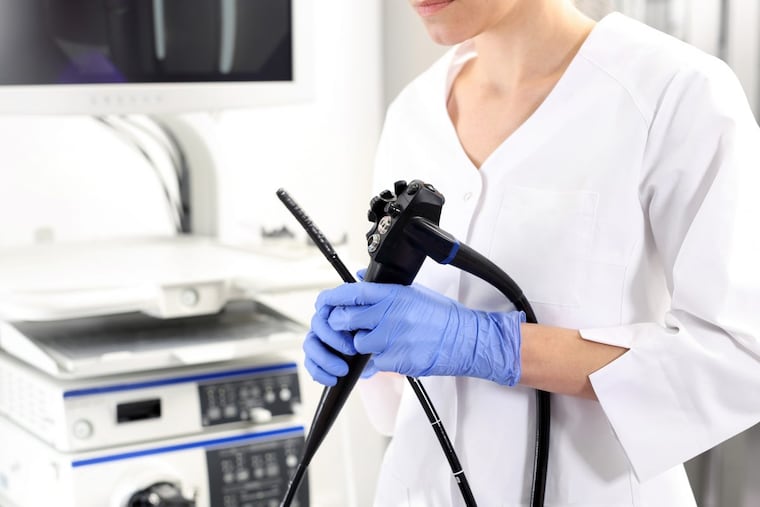Patient beware: Insurance covers colonoscopies in full - except when it doesn't
There's a lot of confusion about the costs associated colonoscopies. We have answers.

With March over and another colon cancer awareness month in the books, the advertisements imploring you to get screened have quieted down. But the message still is everywhere: Starting at age 50, adults should be screened for colon cancer. The options: fecal occult blood testing, stool DNA test, sigmoidoscopy (which examines the left side of the colon), or colonoscopy, the method that many doctors prefer because it scans the entire colon.
There's a lot of confusion about the costs associated with a colonoscopy, during which a doctor scans for pre-cancerous polyps using a long, flexible probe and removes anything suspicious, typically while you're sedated. In fact, it's the procedure we are asked about the most at Philly Health Costs and one of the most searched-for service at our price comparison tool, Philly Price Check.
Here's what you need to know:
Colonoscopies are covered by insurance — with no copay, thanks to the Affordable Care Act — when the main purpose of the test is to screen for cancer in a person who is at average risk for cancer. Private insurance should cover the procedure, called a screening colonoscopy, in full even if a polyp is removed, according to Shazia Siddique, a gastroenterology fellow at Penn Medicine and policy expert for the American Gastroenterological Association, which issues guidelines for colonoscopies. The lab work on the polyp should also be covered because it is related to the same episode of care, she said, though some insurers may not follow that.
When the Affordable Care Act mandated coverage for screening colonoscopies, some patients got caught in a loophole that allowed patients to be billed if a polyp were found, turning what had been a screening test into a diagnostic one. The government in 2013 issued clarification requiring the procedure be covered in full so long as the initial intent was to scan for cancer in a patient who is not considered at high risk for colon cancer.
The same protection does not exist for Medicare beneficiaries, who will owe money if a polyp is removed during their colonoscopy. The copay will be waived, but Medicare beneficiaries will still be responsible for a portion of the bill under the coinsurance provision of their plan, Siddique said.
If a polyp is found during your screening colonoscopy, your doctor may recommend you return for your next colonoscopy sooner than the standard 10-year interval. This next, sooner-than-normal colonoscopy will be billed as a diagnostic procedure and subject to the cost-sharing provisions in your health plan.
Your doctor will decide whether you need to remain on the colonoscopy fast track, depending on whether more polyps are found and whether they are pre-cancerous.
People who don't have insurance will pay out-of-pocket for even a routine screening colonoscopy and should shop around because prices vary widely. In the Philadelphia area, the cash price ranges from $750 to $1,955, according to a survey of providers by ClearHealthCosts, a journalism start-up and partner in the Philly Health Costs price transparency project by the Inquirer and 6ABC.
Though prices vary, the procedure should be pretty much the same wherever you go, according to Christina Tofani, a gastroenterologist at Jefferson University Health. The colonoscopy itself takes about 30 minutes, plus an hour each for procedure prep and recovery (that's in addition to the prep you do at home starting the previous day in order to clean out your bowel).
When deciding where to go, ask your insurer which facilities are covered in your network, Tofani advises. Most patients can have their colonoscopy performed at an outpatient surgery center, rather than a hospital, where services generally cost more. A primary-care doctor can make recommendations for patients with medical conditions, such as cardiac and respiratory issues, that may require the procedure be done at a hospital. And make sure everyone associated with your care is in your network — people have been unpleasantly surprised to discover that their doctor and facility were in network, but the anesthesiologist was not.
Patients may receive up to four bills for the facility, doctor, anesthesiology, and pathology (if a polyp was removed for analysis). So don't be surprised if it takes a while to get the final tally.
Review your bills carefully for mistakes and contact your provider and insurer as soon as possible to correct any errors. One Inquirer reader reported being charged twice for anesthesia. Another reader, Judy Politzer, had her colonoscopy without anesthesia but was billed for it anyway.
While we're on the topic of colonoscopies without anesthesia: Doctors say it is OK to skip anesthesia but don't recommend it for most patients because colonoscopies without sedation can be painful.